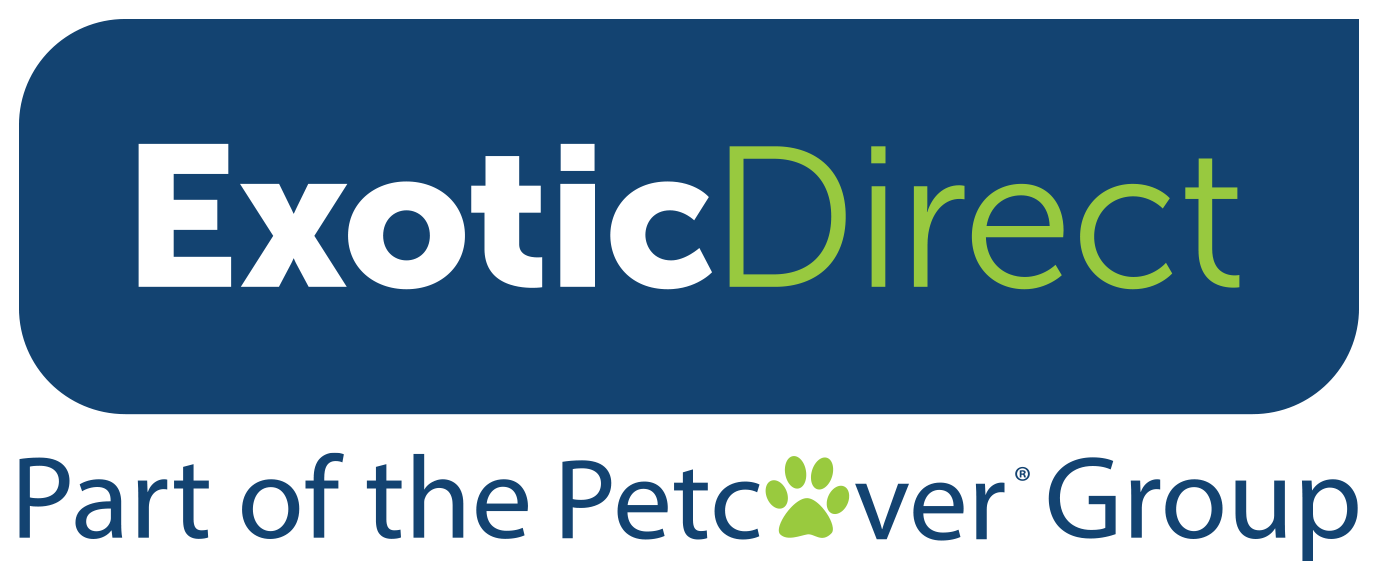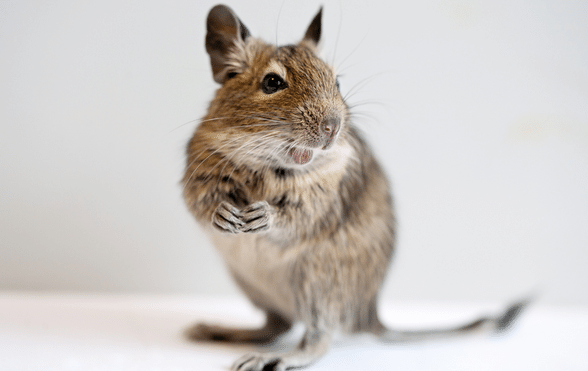The majority of a degu’s diet should consist of good quality hay, such as Timothy Hay or Meadow Hay.
Is your degu insured? Get a quote for £2,000 of vet fee cover | Insure up to 3 pets per policy | We’ve been insuring exotic pets since 1996 | Check out our customer reviews on Feefo
What do degus eat in the wild?
Dietary fibre makes up to 60% of a wild degu’s diet. The remainder of their diet consists of the natural vegetation found on the plains and mountains of Chile – which form part of their natural habitat.
What do domesticated degus like to eat?
- Hay: The majority of a degu’s diet should consist of good quality hay, such as Timothy Hay or Meadow Hay.
Hay should not be brown, green, as green hay can cause bloating. Pink or white hay should be thrown away as it’s a sign of mould.
- Guinea pig or degu specific food: You can give these to your degu, as they contain all the necessary vitamins and minerals suitable for your pet. Ensure they contain no molasses or sugar as these can lead to diabetes. You can buy some dried degu food from Jollyes.
Provide 10g a day, but do not provide freely, as your degu will eat these instead of the hay. Hay is important as it wears down your degu’s teeth and helps maintain a healthy gut.
- Alfalfa hay: You can mix this in with your degu’s hay, however this should only be occasionally. Alfala Hay is high in protein and can lead to health problems if over eaten.
- Fresh water: Your degu’s water should be refreshed everyday.
Cover your degu for up to £2,000 of vet fees, to help cover those unexpected vet bills.
Alternatively you can call us on 0345 982 5505
What vitamins and minerals does my degu need?
Degus will need a balanced diet, with a range of vitamins and minerals. These include:
- Calcium and Phosporous: Your degu’s food should provide a Calcium to Phosphorus ratio of around 2:1. The incorrect ratio can lead to calcification of the kidneys, and dental problems (such as overgrown teeth and roots).
- Vitamin C: Although it’s thought that degus may naturally produce their own vitamin C, it’s still a good idea to ensure it’s in their diet. Check their hard feed as it may already be present – sometimes it’s listed as absorbic acid. If not, you can provide it through broccoli, red peppers, parsley and rosehips.
Don’t add vitamin C to your degu’s water supply as you can’t regulate the consumption, and it degrades quickly when exposed to oxygen.
Why is my degu eating his own poo?
Degus coprophosise, which is when they eat their own poo. They do this to benefit twice from the food they’ve eaten, as the faeces are high in short chain fatty acids and microbes. They tend to eat more of the faeces they produce at night (around 87%). Degus also tend to eat more of their faeces when food is in short supply as it will help to maintain their gut function.
Degu food list
1. Feed once or twice a week on rotation as they can cause bloating
| Asparagus | Carrot tops | Dandelion leaves |
| Broccoli | Cauliflower | Fresh herbs |
| Brussels sprout | Celery | Fresh grass |
| Cabbage | Courgette | Green beans |
2. Feed once or twice a week:
| Beetroot | Dried herbs | Pumpkin |
| Butternut squash | Marigold flowers | Radish |
3. Feed once a month as they are either high in sugar or carbohydrates:
| Apple | Cherry tomatoes | Peas | Sweet potato |
| Carrots | Cucumber | Sweetcorn/corn on the cob |
4. Treats that you can feed your degu
| Sunflower seeds | Pumpkin seeds |
| Peanuts | Wholenuts |
How many treats can I feed my degu?
Alternatively you can call us on 0345 982 5505
- Fruit – degus are prone to diabetes and eating fruit can lead to blood glucose spikes which their bodies need to process. This can put a strain on their bodies. Although some websites say that you can feed fruit very occasionally, ultimately it may be better to avoid it.
- Rabbit food or mix – you should avoid these, as they may contain coccidiostat a substance that’s added to rabbit food in order to prevent the parasite coccodian. Coccidiostat is toxic to degus.
Rabbit food also doesn’t contain the correct amount of vitamins and minerals.
- Molasses and raisins – you should avoid feeding your degu these due to their high sugar content.
- Hamster and Gerbil food – these contain a lot of seeds that are high in protein. Too much protein can make your degu ill, so these foods shouldn’t be fed to your pet.
- Degu pellets that contain mollasses – this is due to the high sugar content of molasses, which can be harmful for your pet.
How much food should I give my degu?
Why is my degu not eating?
When your degu’s struggling to eat, and he’s losing weight, it can be a very worrying time. There can be a range of causes for this. Some of these are listed below:
Your degu may have spurs:
Your degu may have diabetes:
Some degu pellets may contain molasses – these are very high in sugar, and should be avoided.
You should also ensure your degu gets lots of exercise as being overweight can increase the risk of diabetes.
What is diabetes in a degu?
Is your degu insured? Get a quote for £2,000 of vet fee cover | Insure up to 3 pets per policy | We’ve been insuring exotic pets since 1996 | Check out our customer reviews on Feefo
Alternatively you can call us on 0345 982 5505
How much do degus drink?
On average two to three healthy adult degus should be consuming 1000 ml of water a month.
Degus will eat anything – so don’t be fooled
Like with humans, the wrong kind of food can impact on a degu’s health. And like with humans, they do like their food, even if it’s bad for them. Ensure you provide a balanced diet, with plenty of hay. And try to avoid those sugary treats!
Don’t miss out!
Sign up for our FREE monthly newsletter full of interesting content! And it’s spam free.
* indicates required field

